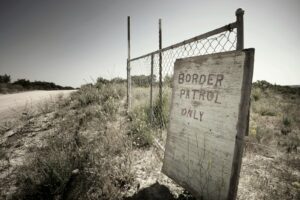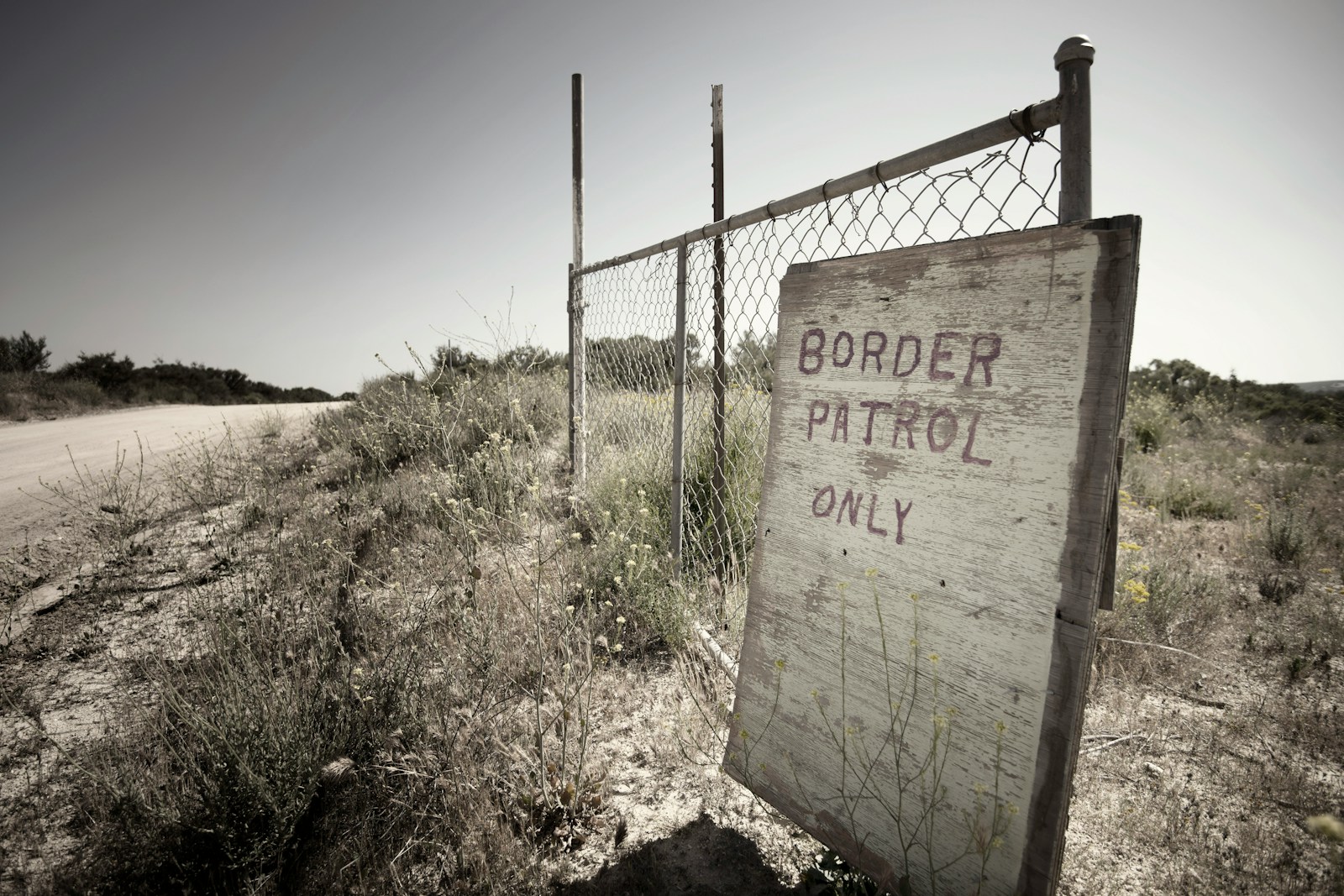February 2020—U.S. on the verge of war
It has been little more than a year since The Bad King declared a national emergency to get money to build his wall on the Southern border to stop the flood of drugs and Mexican rapists and murders from pouring over the border into the country. It seems that he has every anxious soccer mom in rural America convinced that she is either going to be attacked by ISIS or raped by a Mexican on her way to the pizza parlor. Notwithstanding the newly versioned rally chants to: “Finish the Wall”—all the political in-fighting, attacks from the left and bitter media acrimony—not a spade full of dirt has been turned in the furtherance of building the wall. In all that time the issue has been tied up in the courts with challenges that it was an illegal, unconstitutional case of executive overreach, a political stunt by an unpopular, politically imperiled president trying—in a desperate attempt—to appeal to his base in front of the coming 2020 election. Even the usually reliably conservative, staunchly right-wing Texas and Arizona ranchers are in the courts fighting the administration to stop the government from taking their land through the law of eminent domain. The case has been taken up by the Supreme Court (Star Court) where The Bad King expects a victory. But it is likely the usually conservative Chief Justice—in the interest of preserving what little remains of the Court’s judicial integrity—will be the swing vote to finally doom the wall. It is obvious now to everyone except the president and his hard-core base of support that the wall will never be built.

The country now faces a more serious, very real existential threat to its future peace and prosperity. To distract from his domestic political problems, the president has ramped-up his war of words against Iran. He has had his vice-president, known in court circles as The Stooge, denounce our former allies France and Angela Merkel’s Germany for their continued support of the nuclear treaty with Iran from which The Bad King has—in his usual fashion—so precipitously withdrawn the United States. His national security adviser, John Bolton—a dangerous and delusional, conservative war hawk—now speaks openly of regime change in Iran at the instigation and with the encouragement of a rogue Saudi royal prince and that irresponsible and incorrigible international intrigant, Bibi Netanyahu, the current prime minister of Israel. Iran threatens that if they are attacked, they will close the Straits of Hormuz to all commercial oil shipments out of the Persian Gulf and thereby cripple the vulnerable economies of Europe and the West.
The Russians and North Korea are taking advantage of the chaos and disunity in what was formerly a stable international system with the U.S. working in close concert with its western allies. Now those former allies (France, Britain, and Germany) have distanced themselves from the United States—who, with its “America First” policy, is essentially isolated and stands alone. Russia has taken advantage of the situation (the political weakness of The Bad King and lost moral authority of the United States) by moving tanks and troops up to the borders of the Baltic states (former Soviet Republics) Latvia, Estonia, and Lithuania. North Korea—notwithstanding two so-called summits—continues to develop its nuclear program. It just recently resumed testing with a missile shot into the Sea of Japan and another that splashed harmlessly but alarmingly into the Bering Strait a few hundred miles off Anchorage. The Bad King, however, still professes his “love” for the North Korean dictator, and naively and shamelessly continues to pander to Tsar Peter. The world is exponentially a more dangerous place.
On Approach to Dulles International Airport
Billy talks to the tower on the radio and gets clearance to put the CJ-3 on a track for the final approach to Dulles International Airport. Billy has been instructed to proceed to a private terminal used by the CIA for some of its clandestine operations. Shane McGregor, his contact man at the CIA, has promised Billy that there will be a government car there waiting for them.
“Did you actually meet with President Obama?” Rosie asks.
Billy looks at her and nods. “Yes. Shane and I met with him in a late-night meeting in the Situation Room at the White House. There was no staff in the room, just the president and a single White House lawyer.”
“So,” Rosie looks curious, “was he—friendly?”
Billy smiles. “No. He was aware of my resume, my Harvard law background, my clerking on the Supreme Court, and my service in the military as a special operations Army Ranger. So, there was, I guess, a certain grudging respect; but he was not friendly. He was remote and businesslike—and not what you would call a happy man. He had his ass in a big pucker because he didn’t want something like a dirty bomb terrorist attack going down on his watch, and I had the information that he and the CIA wanted—and desperately needed.
“But he gave you the amnesty you wanted,” Rosie interjects.
Billy is matter of fact. “Yep, I was the one with the leverage—the one holding all the cards. I was able to basically hold them up in the negotiation because they were desperate for the information that only I could provide them. Their own intelligence had them informed that there was a plot currently underway to bring into the country nuclear material to manufacture a dirty bomb—a device with the potential to kill millions of people and contaminate a whole region of the United States with deadly radiation for decades. The same intelligence told them that North Korea, a dangerous rogue regime, and Obama’s principle national security worry was probably the source—not Iran. They did not, however, at the time, know who was behind the plot. The Russians—in the event something went wrong—were trying to disguise it as a Hezbollah terrorist operation. The CIA and FBI did not learn until later the real purpose of the operation—that it was intended to be used in a blackmail attempt to get Obama and the Congress to repeal the Magnitsky Act, the sanctions the Congress had voted to put on Russia’s president and his oligarch cronies. Time, however, was running out. Both the CIA and FBI were frantic, under enormous pressure by the administration to find out what was going on.”
“These politicians are all assholes, Rosie. They’ll sacrifice anybody for their own purposes. Obama knew I had them over a barrel. I was the crucial piece in the puzzle. But Obama was not ready to deal, not prepared to grant the amnesty on the terms I was demanding, calling it ‘extortion.’ He bristled and asked me, ‘Don’t you feel a sense of patriotic obligation to your country?’ I did not flinch, reminded him I had served two tours of duty in both Iraq and Afghanistan for my country. He apologized. I smiled and remained cordial. But I held firm in my demand for a full amnesty. I knew what I needed from him if I was going to stay out of jail. And he finally had to relent if they were going to get the information that only I could provide. After a bit more haggling, we agreed on a deal, and I supplied them the information they needed: the “where” and “how” of the smuggling operation, and they gave me what I wanted in writing: a blanket amnesty from prosecution for any and all behavior and activity not yet charged—signed by Barack Obama himself. The whole thing, of course, was kept top secret. The public never learned of a Russia orchestrated terrorist threat.”
Billy looks at Rosie. “I did, however, make one concession. Because of my special forces background, Shane thought I could be of future use to the CIA in a dark ops’ capacity. As part of the deal, I was obliged to sign a cooperation agreement with the government that committed me to work with the CIA and the FBI in whatever capacity needed in whatever actions or investigations should evolve from the information I had provided regarding the smuggling plot.”
“Afterward, on the way out, Shane said to me, ‘You were pretty tough in there. I thought he was going to throw us both out.’”
“No, I replied, “his ass was in a jam, and so was yours if I didn’t tell you what I know about the Russian’s plan to bring the enriched uranium into the country.”
Billy only half laughs, remembering the conversation. “I told Shane,” Billy says with a sly little grin, ‘if I’m going to be killing people for the CIA, I’m going to need some form of compensation.’ The CIA man replied, in his usual confiding and institutional way, ‘trust me, Billy. Money will not be a problem.’”
Twenty minutes later their plane is on the ground. Billy follows the tower’s directions to the private CIA terminal, but Rosie notices that Billy seems to be familiar with the procedure.
“You’ve been here before,” Rosie observes.
“Yeah,” Billy replies, “a number of times.” There was a black SUV parked and waiting on the tarmac. Billy stops their plane a short distance away and shuts down the engines.
“There’s our ride,” Billy says. Suddenly Rosie feels a host of mixed emotions. The last two weeks with Billy have been like a kind of crazy vacation. She has enjoyed her association with Billy—even though she has been scared to death most of the time. She is glad to be back in Washington, but she also knows she will probably be in considerable danger. One thing she is sure about, she does not want Billy to disappear from her life. Rosie realizes if she wants to stay alive, she must now put her trust, and her life, in the hands of a man she barely knows.
“Where are we going?” Rosie asks.
“To a hotel—something close to the White House.” Billy is blunt. “You can’t go back to your apartment. It is too dangerous. It’s probably under surveillance right now. The Russians are not going to give up looking for you.”
“But I’m going back to work, Billy,” Rosie objects. “I’m going to be on TV. I can’t hide from this. They’re going to know I’m back in the city.”
“I know,” Billy replies. “That’s why I’m going to ask Shane to detail a couple of his goons to watch our backs. The CIA has an interest in keeping you alive. You are what they call an “asset.” Billy grins. “Have you got a favorite DC hotel?”
Rosie sighs. “Well—journalists tend to favor the Tabard Inn. The Hay Adams is close, but it is expensive. I can’t afford to live there, Billy.”
“We’ll do the Hay Adams.” Billy grins. “And don’t worry about the money, Rosie, you can put it on your new credit card.”
“Yeah, right,” she says with a sardonic tone. “It probably won’t even work.”
Again, Billy just smiles. “You need to have more faith—Fred.”

